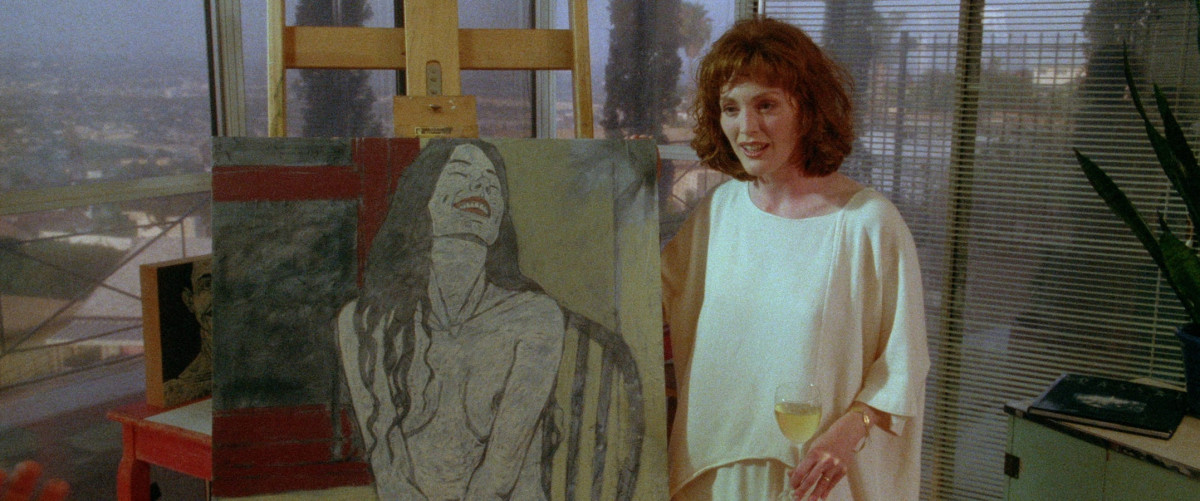 Robert Altman, Short Cuts, 1993
Robert Altman, Short Cuts, 1993About an hour into Short Cuts, one of its 22 principal characters, artist Marian Wyman (Julianne Moore), is on the phone talking up her work to a gallerist. “There is a hard, heavy physicality in my new paintings,” she says. “They’re tempered by their ephemeral use of color. You could almost say that they’re beyond natural color.” Having eavesdropped, her husband, Dr. Ralph Wyman (Matthew Modine), says, “Scientifically speaking, Marian, there’s no such thing as ‘beyond natural color.'”
Just after Ralph speaks, the scene cuts to a corpse, drained of its color and floating in the river. Three fishermen (Fred Ward, Huey Lewis, and Buck Henry) have left the bustle of suburban L.A. to be closer to “nature,” and the discovery of the dead girl interrupts their plans; after the initial shock, they decide to ignore the body and keep fishing, reporting the body when their vacation is over. Suddenly, Marian’s suggestion that her paintings are about “seeing and the responsibility that comes with that” alludes to something all too concrete.
The transition between these scenes is typical of Robert Altman’s sprawling three-hour film. The links between random words and images suggests common denominators among people, places, and objects. In the 90-minute television documentary, Luck, Trust and Ketchup (1993) — one of the numerous features in Criterion Collection’s artfully packaged DVD — Altman reveals the “common denominator” in Short Cuts: “It’s in restaurants and diners across the country, it’s on the kitchen tables of these American people. Ketchup is the common denominator.”
Altman is attracted to such denominators, broad brushstrokes of shared vulnerabilities. Marion and Ralph are really fighting over a past betrayal. The same might be said of fisherman Stuart (Fred Ward) and his wife Claire (Anne Archer). A professional clown for children’s parties, she cannot comprehend his decision to leave the dead body in the water for so long. When both couples share a dinner party, their marital tensions are barely contained. Appropriately, they play the board game Jeopardy and paint their faces a deathly pallor with Claire’s clown cosmetics, literalizing their emotional masks. This idea is repeated in another character, the makeup artist Bill Bush (Robert Downey Jr.), who specializes in “death” scenes, using wife Honey Bush (Lili Taylor) as model in an elaborately staged murder setting.
Death, or that state “beyond natural color,” is Short Cuts‘ common denominator. This interest appears as well in the Raymond Carver short stories on which it’s based. At least, according to poet Tess Gallagher (interviewed in the DVD’s doco), a “dark” vision unites Altman with Carver, her late husband. For all the rapturous, somewhat overwhelming information about Altman and Carver in the DVD’s special features, one thing is clear to all who has known or worked with either: they are “geniuses” and two of the most important “voices” in 20th-century American culture. I kind of agree, but claims to genius make me nervous and hagiography gets a bit tiring after awhile.
Dead at 50, Carver was a poet and short fiction writer whose work treads a tightrope between banality and strangeness, passion and detachment. Carver’s fiction is “all about things that just happen to people and cause their lives to take a turn,” writes Altman in his introduction to Carver’s Short Cuts book, included in the DVD package. “Maybe the bottom falls out. Maybe they have a near-miss with disaster.”
The nine stories in Short Cuts can be divided into two reductive categories: those about characters who survive the “near-miss” and those about characters who don’t. Disaster strikes for Ann and Howard Finnigan (Andie MacDowell and Bruce Davison) when their young son, Casey (Lane Cassidy), is hit by a car. Initially he appears to be fine, but later slips into a coma. The disaster provides the illusion of a near-miss for the car’s driver, waitress Doreen Piggot (Lily Tomlin). When she tells her husband Earl (Tom Waits) how she hit the boy and how her life could have changed forever had he died, Earl is more concerned about the micro-length of Doreen’s work skirt. For Altman, one person’s disaster is another’s near-miss. He writes in the Short Cuts book introduction, “Somebody wins the lottery. The same day, that person’s sister is killed by a brick falling of a building in Seattle. Those are both the same thing… One got killed and the other got rich; it’s the same action.”
These hypothetical “actions” don’t appear in the film, but it is filled with seemingly random interconnections. Self-contained narratives in print, Carver’s stories become one for Altman. Ann and Howard’s story in particular is “the clothesline, the story that carries the line all the way through,” says Altman to Tim Robbins in a specially produced interview for the DVD. Perhaps this is why the Finnigans’ story remains largely intact in comparison to others, reconstructed from the source material. In the Doreen and Earl story, derived from Carver’s “They’re Not Your Husband,” Earl convinces Doreen to lose a lot of weight. This plot is hinted at in the film, but replaced by an escalating alcoholism that renders their relationship dysfunctional and codependent.
Short Cuts was attacked by literary purists upon release because Altman rewrote much of Carver’s texts to contrive connections. Not to mention the way he uproots the characters from Northwest “Carver Country” to suburban L.A. Or the way the overarching poverty of Carver’s milieu is given a class booster. But Gallagher is quick to defend Altman, calling the film a “collaboration,” again, between two geniuses. Short Cuts, she says, is Carver “in spirit.” Apparently Carver was a fan of Altman’s Nashville (1975), so Gallagher reckons he’d like Short Cuts. Really, who wouldn’t? Like ketchup, Short Cuts is an example of “America,” bottled and beyond natural color.
Film review of Short Cuts (Robert Altman, 1993) for PopMatters.
Published by PopMatters in 2005.